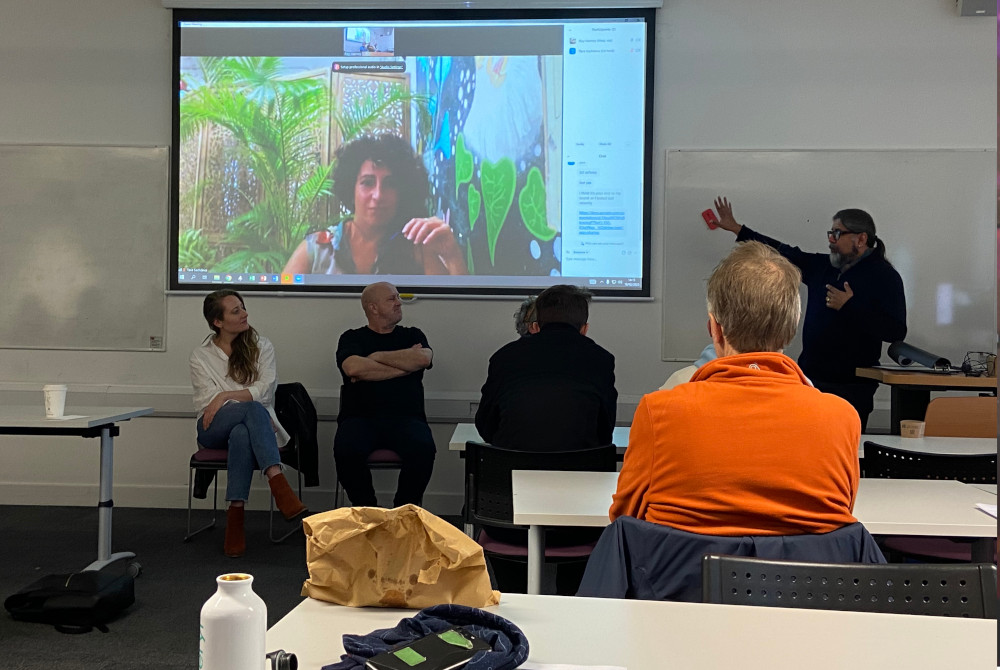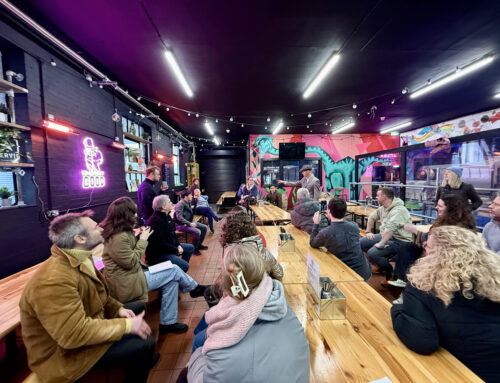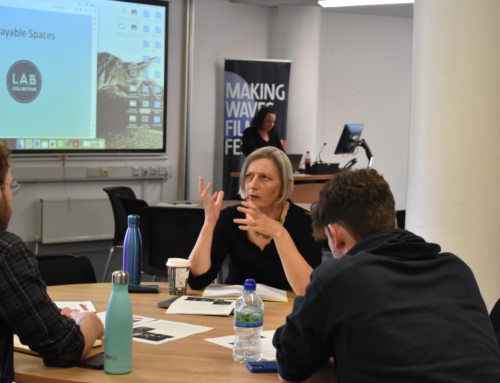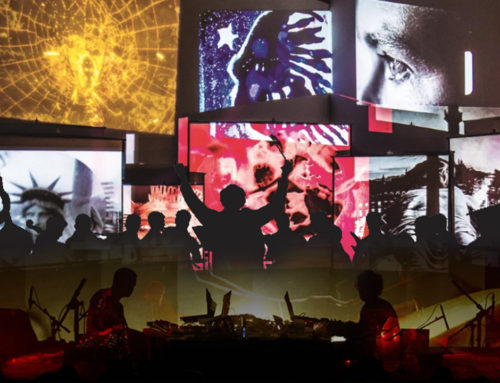As many fellow cinema-goers fear, the future of cinemas in today’s era of streaming service giants appears uncertain. Still, hope clings on that going to the cinema doesn’t have an expiry date any time soon. The good news is that a cinema crisis isn’t near and there is so much to look forward to. At the “Wave Makers Creative Producers Lab: What is the Future of the Cinema?” event at the University of Portsmouth on 18 February, the potential for immersive cinema to be part of that ongoing success was put to the test.
The Creative Producers Lab had a successful turnout and opened with attendees engaging in workshops that explored event marketing, event management and community & live cinema programming. The event marketing lab, hosted by Bill Sainsbury of Making Waves Film Festival and Malisa Chafer of No.6 Cinema, covered the basics of marketing film events and introduced some key marketing principles such as AIDA (Attention, Interest, Desire and Action) and the marketing 5 P’s.
Community and Live Cinema Programming, hosted by Neil Ramjee of BFI Film Hub SW, covered how to build an audience and gave an outline of what is considered to be ‘best practice’. A pivotal topic covered in the lab was considering how to host an event that honours accessibility, especially for those with particular needs and those who live with neurodiversity. The session explored how cinema experiences affect these groups of individuals and how they function at a cinema event like this when there are overwhelming stimuli such as flashing lights and loud volume that can startle those with sensory issues.
Event Management looked in detail at one of the most exciting aspects of the day’s topic: the experience, planning and management of an immersive event. Dividing the planning between two teams and taking the 1973 release That Will Be The Day; one team explored the environment and more logistic side of the event whilst the other built a story around the immersive cinema experience that would take the audience on an adventure. The session ended with a call by the organisers to put this show on in Portsmouth and everyone seemed keen to be involved.
The afternoon panel session featured an impressive array of speakers on the topic of live and event cinema. As the director of Compass Presents, Tara Sachedeva, and Creative Producer of Creative Giants Arts, Charlotte March, explained in their panel presentations, immersive cinema is becoming more popular and intriguing than ever before. Immersive Cinema takes cinema and makes it into a live, engaging, sensory experience that brings audiences in to feel a film in a way that brings them in further than ever before. At events like those staged by Secret Cinema, films like Singing in the Rain, Wes Anderson Films and vintage films like Grease can become alive in the most indulging manner that could be imagined.
In Portsmouth, this magic is being bought into our city through local organisations like DVMISSION and No.6 Cinema. No.6 Cinema’s arthouse and niche cinema picks are accompanied, at times, by their creative volunteers’ ideas through costume, and decor all adding to the atmosphere of the experience. DVMISSION, the riveting, annual 48-hour-filmmaking festival has for many years been adding immersive performances into their screening ceremonies. Last year, they had zombie-like performers creeping around the venue and plus a remarkable puppet that dominated the entire show.
Whilst DVMISSION and No.6 Cinema bring their experiences alive on a smaller budget, Charlotte explained during her panel presentation that the giant, mega-millions shows she works in are becoming more expensive to stage as they become more popular and less niche. Venues are charging more for rent as they are becoming aware of how much these shows make. And with the cost of living crisis ongoing, attending these kinds of shows is becoming as expensive as going on a holiday.
Even with its’ difficulties, the immersive cinema industry has a massive amount of potential to broaden its activities across the UK in all shapes and forms. For example, neurodiverse screenings can grant accessibility to neurodiverse individuals who want to be able to go to the cinema and be able to be themselves without being frowned upon. BFI Film Hub Southwest Community Manger Neil Ramjee told us that:
“With screenings aimed for neurodiverse adults in the last couple of years, the majority of the films shown have been made for children. Whilst all neurodiverse people operate on a degree of levels, neurodiverse people have astounding abilities and remarkable skills and are entitled to have an accessible cinema experience rather than have to stay home because they are ‘too disruptive’ to go to the cinema.”
Neil Ramjee, Community Manager, Film Hub Southwest
Neurodiverse screening entails individuals being able to stim, tic and move around without receiving complaints. These screenings take into account sensory issues and play no ads at the beginning of the film. Some organisations also have begun posting photos online of every seat in their theatre to help neurodivergent audiences know what their seat will look like before going to a show, what their view will be and give them ease.
The future of cinema is immersive and accessible. But with all the ideas and possibilities in front of us, is the classic cinema included in these plans? Well, if the future is accessible, surely, it must be.
By Kearin Green, 19th February 2023






